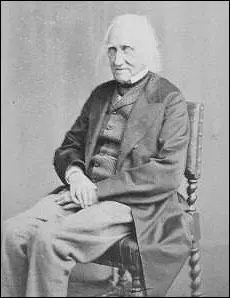Charles Knight
Charles Knight, the son of Charles Knight, a bookseller, was born in Windsor on 15th March, 1791. One of his customers was King George III. On one morning he was horrified to find the king reading in his shop, a copy of The Rights of Man by Tom Paine. Although the king made no comment the book was soon banned and Paine was charged with seditious libel.
In 1812 Knight began writing for The Globe. Later that year Knight and his father began publishing the Windsor and Eton Express. Other publishing ventures included The Plain Englishman, The London Guardian and Knight's Quarterly Magazine.
In March 1828 Charles Knight joined with Henry Brougham to form the Society for the Diffusion of Useful Knowledge. Knight became the society's publisher and over the next few years produced the Quarterly Journal of Education (1831-36), Penny Magazine (1832-45) and Penny Cyclopedia (1833-44). Other innovations included the publication in parts of The Pictorial Bible (1836), The Pictorial History of England (1837), Pictorial Shakespeare (1838) and Biographical Dictionary (1846).
Charles Knight's Penny Magazine sold 200,000 copies a week. Richard Altrick, the author of The English Common Reader: A Social History of the Mass Reading Public (1957), has pointed out: "Knight... went to great trouble and expense to obtain good woodcuts. Like the publishers of number-books, he seems to have consciously intended this emphasis upon pictures as a means of bringing printed matter to the attention of a public unaccustomed to reading. Even the illiterate found a good pennyworth of enjoyment in the illustrations each issue of the Penny Magazine contained. And these, perhaps more than the letterpress, were responsible for the affection with which many buyers thought of the magazine in retrospect."

Some of Knight's business ventures were very successful. For example, the 27 volume, Penny Cyclopedia were very popular. Others were complete failures and when the publication of the Biographical Dictionary lost £5,000, the Society for the Diffusion of Useful Knowledge came to an end.
Knight continued with the idea of pictorial part-works. In 1847 he began The Land We Live In, that contained pictures and descriptions of everything noteworthy in England. The following year he started the weekly periodical, The Voice of the People, but it only lasted for three weeks.
The English Cyclopedia, a revised version of the Penny Cyclopedia appeared between 1853-61, and the Popular History of England (1856-1862). Knight said that his latest venture was "to trace through our annals the essential connection between our political history and our social history" that will enable the people to "learn their own history - how they have grown out of slavery, out of feudal wrong, out of regal despotism - into constitutional liberty, and the greatest estate of the realm.". Knight also wrote his autobiography, Passages of a Working Life (1864).
Charles Knight died on 9th March, 1873.
Primary Sources
(1) Richard Altrick, The English Common Reader: A Social History of the Mass Reading Public 1800-1900 (1957)
Knight... went to great trouble and expense to obtain good woodcuts. Like the publishers of number-books, he seems to have consciously intended this emphasis upon pictures as a means of bringing printed matter to the attention of a public unaccustomed to reading. Even the illiterate found a good pennyworth of enjoyment in the illustrations each issue of the Penny Magazine contained. And these, perhaps more than the letterpress, were responsible for the affection with which many buyers thought of the magazine in retrospect.

